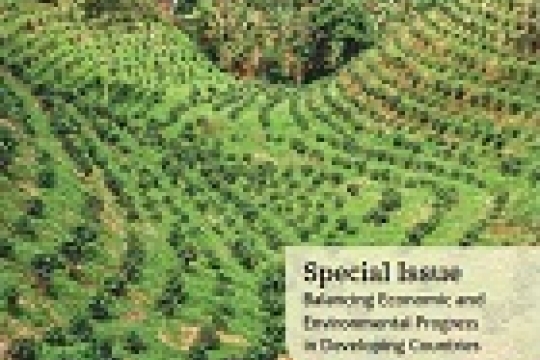The latest issue of RFF Resources magazine is a special issue on "Balancing Economic and Environmental Progress in Developing Countries". It is being guest edited by EfD Research Fellow Allen Blackman, RFF Senior Fellow, and contains an interview with EfD Director Gunnar Köhlin as well as articles by Professor Thomas Sterner and other EfD members.
Gunnar Köhlin, Director of the Environment for Development initiative, and co-founder of the University of Gothenburg’s Environmental Economics Unit, talks with Resources about how EfD improves policymaking in developing countries through the use of environmental economics:
”The EfD initiative, which we launched in 2007, is setting up environmental economics think tanks at academic institutions with graduate programs in developing countries. It links researchers to international funding and collaborators while strengthening the interface with the policy processes,” says Gunnar Köhlin.
The University of Gothenburg’s Environmental Economics Unit started a capacity-building program in environmental economics more than 20 years ago, supported by the Swedish International Development Cooperation Agency. The expectation was that when researchers with Ph.D.s who specialized in environmental economics returned to their native countries, they would not only train the next generation of academics and civil servants but also contribute applied research and policy advice.
“After some time, we realized that our colleagues instead were lost to university administration and short-term consultancies. I became intrigued by this problem and spent two years in Ethiopia to see what could be done to “plug in” our colleagues to various policy processes. I then realized that the highway that RFF, for example, has built from research to policy implementation was filled with potholes in many developing countries. My colleagues at the University of Gothenburg and I identified four distinct gaps that precluded the inclusion of environmental economics analysis in policymaking” says Gunnar Köhlin.
He explains that the first gap was a capacity gap: there just weren’t enough academically trained environmental economists at universities and government agencies to carry out such analysis. The second was the resulting analytical gap. The third gap was especially unnerving: even when there was analysis, it was not communicated in the relevant policy contexts – a communication gap. Finally, despite the existence of well-trained environmental economists, important problems to study, and resources from governments and donors, the three were seldom matched – an institutional gap. Hence, the EfD initiative is designed to meet all four gaps.
Read the entire interview with Gunnar Köhlin: Connecting Environmental Economics and Policy in Developing Countries: http://www.rff.org/Publications/Resources/Pages/180-QA.aspx
Articles have been written by EfD members Thomas Sterner (Climate Change & Developing Countries Considerations for Rio+20), Jintao Xu and Juha Siikamäki (Forest Tenure Reform in China), Roger Madrigal (Managing Rural Water Systems: Keys to Success), and Allen Blackman (Eco-certification in Developing Countries: Truth in Advertising? and the Editor´s Note: Environmental Management in Developing Countries).
An electronic version of the entire special issue, as well as pdfs of the individual articles, is available at http://www.rff.org/Publications/Resources/Pages/default.aspx
Read the issue using RFF`s flash reader: http://issuu.com/resources-for-the-future/docs/resources-180?mode=window&backgroundColor=%23222222
Resources for the Future (RFF) is widely recognized as a pioneer in the field of resource economics. It is an American nonprofit organization that conducts independent research into environmental, energy, and natural resource issues, primarily via economics and other social sciences. Headquartered in Washington, D.C., RFF performs research around the world. Founded in 1952 with initial grants from the Ford Foundation, RFF became the first "think tank" devoted exclusively to natural resource and environmental issues and focused in its early years on natural resource scarcity and import dependence, helping to pioneer the field of resource economics.
